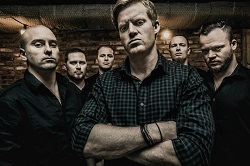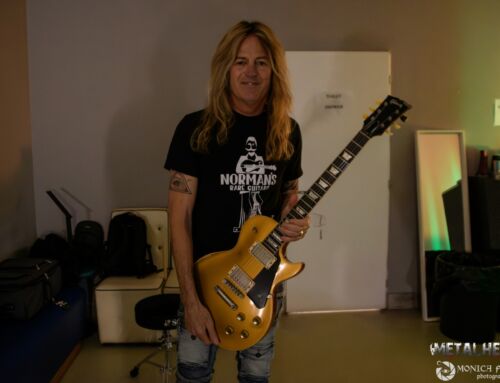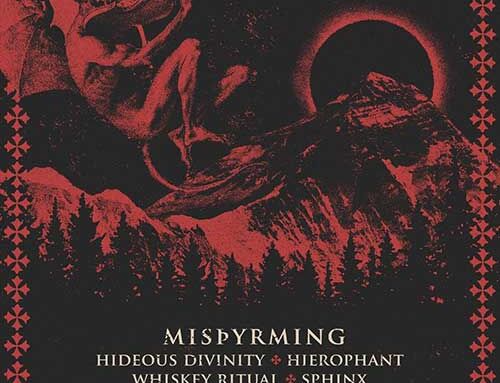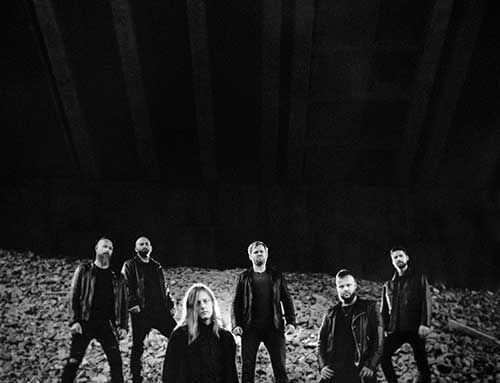 They exist somehow in between two musical directions: avantgarde/progessive and death metal. But they are from the blackest country of the world, Norway. They get the same inspiration black metal bands live upon, but the result is different, original. They sound so deep, so dark, so evil and their creativity is something the press sees as distinctive, a creativity they look like being doomed to improve every time. With this sound, sometimes, one wonders how this band managed to create these tunes or those feelings. Well, we got to enjoy a talk with Johnar Haaland (guitar) and Andreas Frigstad (vocals), and they really revealed some interesting details about their creative process and their composing methods. (versione italiana)
They exist somehow in between two musical directions: avantgarde/progessive and death metal. But they are from the blackest country of the world, Norway. They get the same inspiration black metal bands live upon, but the result is different, original. They sound so deep, so dark, so evil and their creativity is something the press sees as distinctive, a creativity they look like being doomed to improve every time. With this sound, sometimes, one wonders how this band managed to create these tunes or those feelings. Well, we got to enjoy a talk with Johnar Haaland (guitar) and Andreas Frigstad (vocals), and they really revealed some interesting details about their creative process and their composing methods. (versione italiana)
Hello guys! Thanks for the chance to ask you few questions. I just reviewed your latest effort “Ænigma”. Can you tell me something about the writing and recording process of such an album, so rich of advanced sounds? Also tell me, please, about this pre-production news, as it seems all your former works were done without rehearsals or pre productions…
Andreas: You are correct; this was the first time we did a pre production before we entered the studio. We also got the chance to rehearse the new songs and were more prepared before the recording process started. That resulted in us doing changes to the songs and I also think we made them more live compatible.
Johnar: It probably sounds weird, but both our former albums were recorded without any rehearsals or preproduction at all. This was due to the fact that we had to record in the summer and thus spent the entire summer on the recording itself. Back in the days we did not own any studio equipment, which we have invested in now. Being able to do a pre-production had an immense effect on the album.
I wrote that for musical direction you remember be of Shining. Not that you play the same stuff, not at all, but it is the approach to song writing and music composition that makes you guys pretty much different from the others. What do you think? How does an In Vain song become reality?
Johnar: I do not know Shining well enough to comment specifically on that. However, I do not have any specific song structure in mind when I write songs. Normally I just go with whatever feels natural as the song develops. However, on certain songs I have an idea upfront. E.g. on the songs “The Titan” (album “The Latter Rain”) and “Captivating Solitude” (album “Mantra”) my intention was to write a more simple song with less riffs. You need that kind of songs on an album where most tracks are quite complex and varied. Both of the above mentioned songs are basically just based upon the same 3-4 chords during the entire song, but with different variations and new elements added throughout the song. In general I have a very open mind and I let the song tell me where it wants to go. When I get the right stomach feeling I know that the song is done.
You claimed that on the arrangements you tried to make the songs more slim and effective, and removed parts that were not necessarily needed. Some will say you made your music simple and then more commercial. What’s your opinion about?
Johnar: I can agree to some extent. Making the songs shorter and less complex is sort of a way to make them more commercial. However, if you scrutinize our songs I think you will realize that they are still very complex; there are many riffs and elements involved. As one reviewer mentioned, you can split the CD into two parts, with track 1-3 being a bit more “easy-listening” than the rest of the CD. In the past some have criticized us for making songs that are too long and with too many riffs. This time around we wanted to try a bit different approach, and only include the riffs we felt were totally necessary in every song. Some people will not be happy with whatever you do, and it will always be like that.
As I wrote on my review: where does the separating line lies? I mean the line that separates the identification with one’s own style, one’s own artistic identity from a more or less real flattening of the evolutive creation curve?
Johnar: When it comes to my own personal preferences I only enjoy bands with some kind of originality. With that being said, originality in itself is not enough. For me to enjoy a band they also need to produce quality songs. Why should I listen to a band which is only a mediocre copy of something else? In my opinion, I listen to the best bands within the various styles that I enjoy. I am not looking for bands who try to create a new musical genre or have some kind of weird mix of styles. In my opinion, having a very strong vocalist can be enough to give a band certain edge and something unique. When I say that I want a band to be original I am saying that I want to know exactly what band I am listening to when I hear them on the stereo.
Lyrically the album is not a concept. But an opera like this, with such a complex musical path, is often bound to a concept album. Can you explain this separation from the music compact direction and the different lyrics?
Andreas: It’s Johnar and I who write the lyrics in the band. There is not any planning going on about what the lyrics should deal with. We write about the things we care about at the time we prepare for a new album. Whether it’s about historical events, personal matters or our point of view on where the world is heading. We have no restrictions in In Vain so basically our lyrics could be about anything. But obviously we both have a feeling on what is suitable for the In Vain ‘package’.
Again about Lyrics, can you tell more about the topics you cover on the various songs?
Andreas: I can tell you a bit about one of my lyrics – “Times Of Yore”. This song is about me sometimes feeling that the modern life is to hectic, that in general there is a sort of time pressure on everything. In these times I’m longing back to being out in the forest and simply enjoying the peacefulness, or being out fishing and embracing life’s simplicity. I have a special place on my grandfathers old farm in the country side, and when I’m out there I always get reminded that this is where I really belong. “Times Of Yore” means ‘Good Old Days’ and in short words it’s me longing back to a more simple way of life.
On the new album I absolutely love those folk/atmospheric moments with that speech in norwegian (like in “Culmination Of Enigma” and “Rise Against”). They kind emit that feeling describing your country, at least from us, southern Europe point if view. Can you explain more?
Andreas: I assume you are talking about the spoken words of Cornelius (note: Cornelius Jakhelln of Solefald). He sent us a bunch of poems and we picked the one’s we thought would give the right atmosphere. We let Cornelius perform them in the way he felt was suitable and it turned out really cool. The poems are written in “New Norwegian” (actually and old form of writing Norwegian, even though it’s called New Norwegian) and this New Norwegian gives a powerful national feeling. New Norwegian (or Norwegian Nynorsk) is a collection of different dialects mostly spoken in the western side of Norway.
Your singings space from a violent growl, to a more compact dark voice, then the choruses, the spoken, the clean voice. It’s like having a whole wide range of musical instrument to play with. How do you choose the different voices, and how do you decide who signs what/how?
Andreas: Choosing the different vocal styles is part of the composing of the songs and Johnar usually has an opinion about that already while creating the songs. We use various vocal styles simply to create the correct atmosphere in the music.
Johnar: When I write the songs I quite quickly get a feeling on what sort of vocals that would fit the various riffs. Sometimes we experiment. We also like to have double vocals, e.g. one black and one death on top of each other.
I’d like to focus on two songs I love. One is “Time Of Yore”: I die for that death metal aggressive main riff. I also love how it evolves to melodic, keeping things flowing nicely, perfect mix of different stuff. Can you tell us more about this song, it’s meaning and how you did it? The other song is “Floating on the Murmuring Tide”. It’s the longest. Such a complex thing. Tell me about it…. tell me about it’s evolution, it’s Sax which I loved… unveil this jewel to your fans…
Johnar: With “Times of Yore” my intention was to write a more fast and aggressive song. I was thinking about our first EP “Will the Sun Ever Rise”, and trying to get back some of the aggression we had back then. The opening riff is a typical old school Death Metal riff, while the chorus has a strong Black Metal feeling. I added those harmonic guitar lines to the Black Metal chorus to get some variation and to spice things up a bit. Additionally, the kind of singing screaming vocals used in the chorus gave a different feeling, instead of it being just a standard Black Metal riff. In the outro I originally wanted speaking vocals. That did not work. We also tried singing vocals, which did not work either. So in the end I added E-Bow and some synths and I thought that gave the outro riff a very floating atmospheric feeling. Actually, that outro riff is one of my favourite riffs on the entire album. The story behind Floating on the Murmuring Tide is actually a bit interesting. The main riff was originally the intro riff to the song “Image of Time”. But I decided to make “Image of Time” a shorter song, and I also liked the intro riff so much that I wanted to build an entire song around it. The idea was to have one main riff sort of repeating throughout the song, and just to add various breathers in between. We brought a saxophone player to the studio and got her to improvise on about half of the songs on the album. I think her work on this song was some of the best. The sax has been with In Vain since the release of our EP “Wounds” back in 2005. Check out the song “In Remembrance”, which I think is a track where the sax is utilized in a very special way.
I see you stick with Indie Recordings. Their roster includes some greats act like God Seed, Wardruna, Borknagar and Audrey Horne to name few. Can you tell us how’s the relationship with Indie and how’s working with ‘em?
Andreas: Indie Recordings has grown to be the biggest metal label in Norway and we are pleased to be on their roster together with so many other great bands. To be signed on such a label gives us better access to join tours and also the possibility to keep recording new albums.
You’re soon on tour with Solefald and Vreid. Looks like you guys are all friends together…. I see you toured a lot with Vreid in the past and Lazare and Cornelius from Solefald are also guests on your album. How did they help out on “Ænigma”?
Johnar: We did a tour with Vreid in 2007 and we have also played several shows with them. They are good friends of us and we always enjoy their company. Solefald and In Vain are bonded by blood, with Sindre (note: clean vocals and keys) being the younger brother of Lazare. With regards to our Solefald cooperation, I approached them back in 2011 with the idea of In Vain being the live backing band for Solefald. Luckily they understood the benefits of this and we did our first show together in 2012. Both Cornelius and Lazare did vocals on “Ænigma”.
What about you being the backing for Solefald? That means most of you will play two gigs per night? Who will be on stage twice? How do you think you can do that?
Johnar: Correct. All of In Vain will be on the stage twice, except our main singer Andreas. I think it will be tiresome and indeed very sweaty. The last part is what I am looking forward to the least… Energy wise I would prefer giving 100% for just one band, but I think we will manage ok. I look upon it as a round of good cardio exercise every evening (note: laughs)
I see the Norwegian extreme scene is pretty mixed up. Like you are all the same people going around somehow, helping out from one band to another. You are now helping out Solefald. Once Lazare drummed for Carpathian Forest. Recently Gorgoroth called Hoest of Taake to replace Pest at the mic… Can you describe this situation?
Andreas: The metal scene in Norway isn’t really that big and most people know about each other. We don’t play in a band because we want to become millionaires, so it makes sense to help people out. We play in a band because it’s fun and adds value to our lives. So if we feel like helping out a band that needs our musical abilities we will do it.
A personal Question: do you know Daniel Vrangsinn, actual bassist for Carpathian Forest? Do you know Misantrof, his label, and the principles behind it? Do you like that concept? Also, your opinion about the music industry nowadays. I care about your opinion as you don’t try to create popular music, so it’s pretty much important to see how a band like In Vain lives on, commercially speaking.
Andreas: Sorry I don’t know much about Mr. Vrangsinn. In relation to your other question we are very lucky here in Norway to have a government that sponsors cultural activities such as sports, bands and so on.
Some bands get support from the government to go on tours, etc. You need to apply, and if you are a good band and have a good application your chances are good. This kind of support helps many of the Norwegian bands to keep the activity on such a high level.
Johnar: It is no surprise that we do not make any money from record sales. Many people have the view that this is not that important because they rather want to buy merch from the band and don’t want to support the big “evil” labels. However, the amount of records we sell will be very crucial when Indie Recordings decide on whether or not to release a new In Vain album. At the end of the day the labels need to make money. We hope to sell many records because that increases the chance for us to record new albums. So if all our fans just download our music, that is not helping us much in that sense unfortunately. I think many are not aware of this fact, and in the end what happens is that concerts gets more expensive, small labels need to quit, etc. I enjoy streaming and checking out new music, but If I like a band I support and buy their albums.
Ok! Thanks for your time. It was a pleasure to get in touch with you. Please close this interview the way you prefer, but don’t forget to send a message to your fans in Italy, also because you’ll have two gigs here very very soon!
Andreas: Thank you so much for your time Luca. We are really looking forward to the two gigs in Italy in April. We will play in Travagliato and Firenze on the 13 and 14 April together with Vreid and Solefald! Hopefully we’ll meet some fans and also get to experience some of your great country food and everything! Thanks for your support!
(Luca Zakk)



